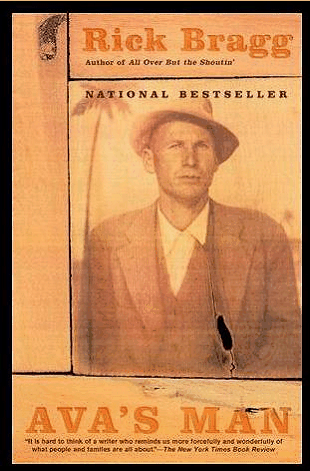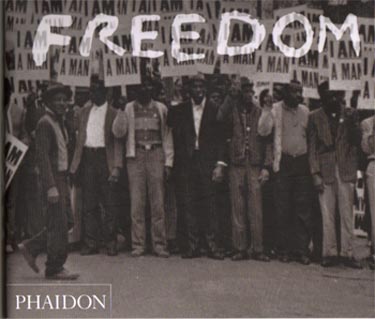















Southern Press
A Review of
Ava's Man
(Rick Bragg; New York: Alfred A. Knopf, 2011.)
Ava's Man
(Rick Bragg; New York: Alfred A. Knopf, 2011.)
Hardly a boring, cumbersome tome or another dust-catching photo album chock-full of the all too familiar pictures of slaves laboriously picking cotton (or disturbing images of lifeless black men hanging from trees as their white executioners, no doubt proud of their actions, casually gather below), Freedom explores the African American journey from the slave house to the White House. A virtual treasury of documented history, this book examines the plight of early blacks, honors those whose efforts changed a society and celebrates the lives of those who overcame social or economic adversities, rising to prominence in their respective fields.
If a single picture is worth a thousand words, the value of this book, which contains hundreds of photographs, is immeasurable. Daring to feature unfortunate aspects of America's past that some downplay even today and, still, others would rather forget, Freedom uncovers the shameful, wicked countenance of bigotry, evoking pity and helpless compassion for its past victims while inciting rage against those who foolishly perpetuate hatred and racial prejudice.
Unforgettable images captured include those of a freed slave whose bare, mutilated back discloses his former treatment by an oppressive, sadistic owner; the bullet-riddled, burning body of a black man accused of assaulting a white girl in Omaha, Nebraska, in 1919; a grief-stricken Mamie Till at the funeral of her 14-year-old son Emmett who had been abducted, brutally tortured and murdered for allegedly whistling or 'familiarly' speaking to a white woman in August 1955; and a young woman's face feeling the brunt of a fellow black's open hand as they prepare for the "physical abuse and vigilante violence that frequently occurred in civil rights organizing efforts in the Deep South" during the 1960s.
But not every photograph is poignant, unsettling or repulsive and, along the way, African Americans have seen their share of triumphs in spite of persecutions and violence. A picture taken in London in 1872 depicts Nashville's renowned Fisk Jubilee Singers who popularly performed spirituals before white audiences throughout the Midwest and Eastern U.S. as well as Europe. Captured in 1939 is an amazing view of around 75,000 gathered at the Lincoln Memorial in Washington to hear a black woman sing-in this case the elegant and beautiful Marian Anderson. Then, there is a shot of a strong, stoic Coretta Scott King, taken on April 16, 1968 in the midst of intense heartbreak and sadness, marching in Memphis for better working conditions for the city's sanitation workers. Her husband, civil rights leader Dr. Martin Luther King, Jr., was to lead the peaceful protest, but was gunned down just days earlier. (The demonstration, incidentally, was effective and Memphis reached a settlement with its workers.)
If a single picture is worth a thousand words, the value of this book, which contains hundreds of photographs, is immeasurable. Daring to feature unfortunate aspects of America's past that some downplay even today and, still, others would rather forget, Freedom uncovers the shameful, wicked countenance of bigotry, evoking pity and helpless compassion for its past victims while inciting rage against those who foolishly perpetuate hatred and racial prejudice.
Unforgettable images captured include those of a freed slave whose bare, mutilated back discloses his former treatment by an oppressive, sadistic owner; the bullet-riddled, burning body of a black man accused of assaulting a white girl in Omaha, Nebraska, in 1919; a grief-stricken Mamie Till at the funeral of her 14-year-old son Emmett who had been abducted, brutally tortured and murdered for allegedly whistling or 'familiarly' speaking to a white woman in August 1955; and a young woman's face feeling the brunt of a fellow black's open hand as they prepare for the "physical abuse and vigilante violence that frequently occurred in civil rights organizing efforts in the Deep South" during the 1960s.
But not every photograph is poignant, unsettling or repulsive and, along the way, African Americans have seen their share of triumphs in spite of persecutions and violence. A picture taken in London in 1872 depicts Nashville's renowned Fisk Jubilee Singers who popularly performed spirituals before white audiences throughout the Midwest and Eastern U.S. as well as Europe. Captured in 1939 is an amazing view of around 75,000 gathered at the Lincoln Memorial in Washington to hear a black woman sing-in this case the elegant and beautiful Marian Anderson. Then, there is a shot of a strong, stoic Coretta Scott King, taken on April 16, 1968 in the midst of intense heartbreak and sadness, marching in Memphis for better working conditions for the city's sanitation workers. Her husband, civil rights leader Dr. Martin Luther King, Jr., was to lead the peaceful protest, but was gunned down just days earlier. (The demonstration, incidentally, was effective and Memphis reached a settlement with its workers.)

By Allen Hott
My neighbors tease me about my recliner pillow that states, "I may not be from the South, but I got here as fast as I could." That is, however, the truth in my case. I only regret that I didn't get here fast enough that I would have had a chance to meet Charlie Bundrum. Charlie, Rick Bragg's granddad, was Ava's Man. This story by Bragg is one of the best biographies of a southern man that has ever been written.
Charlie, which was his legal name, was a true mountain man who spent most of his life in northern Alabama and southern Georgia. And, honestly, much of that life was spent moving! During a ten-year period during the Great Depression, Charlie moved his ever-growing family a total of twenty-one times. Most of these moves were because he was always chasing jobs in the building trade. Charlie worked as a roofer and carpenter, but he also earned both money and food by moonshining and fishing. The moonshine that he illegally brewed was sold (after his testing of its quality), and the fish that he caught (primarily on trotlines) fed his family. Charlie also worked in steel mills on occasion, and often picked cotton, peaches and other items, if the opportunity and pay came at the right time. He was a big man, but not a heavy man. His muscles were hewn from all of the hard work, and his hands were huge and worn to the exact toughness that a man needed for outdoor work and occasionally putting down an opponent.
My neighbors tease me about my recliner pillow that states, "I may not be from the South, but I got here as fast as I could." That is, however, the truth in my case. I only regret that I didn't get here fast enough that I would have had a chance to meet Charlie Bundrum. Charlie, Rick Bragg's granddad, was Ava's Man. This story by Bragg is one of the best biographies of a southern man that has ever been written.
Charlie, which was his legal name, was a true mountain man who spent most of his life in northern Alabama and southern Georgia. And, honestly, much of that life was spent moving! During a ten-year period during the Great Depression, Charlie moved his ever-growing family a total of twenty-one times. Most of these moves were because he was always chasing jobs in the building trade. Charlie worked as a roofer and carpenter, but he also earned both money and food by moonshining and fishing. The moonshine that he illegally brewed was sold (after his testing of its quality), and the fish that he caught (primarily on trotlines) fed his family. Charlie also worked in steel mills on occasion, and often picked cotton, peaches and other items, if the opportunity and pay came at the right time. He was a big man, but not a heavy man. His muscles were hewn from all of the hard work, and his hands were huge and worn to the exact toughness that a man needed for outdoor work and occasionally putting down an opponent.
And, lastly, there are those pictures of blacks who have achieved the once impossible. These include that of a jubilant and glamorous Oprah Winfrey whose entertainment enterprise has garnered her international acclaim and a billion dollar fortune. Also featured is a photo taken at a meeting of the National Security Council in the Cabinet Room of the White House in which two of the most politically powerful African Americans in history-Colin Powell and Condoleeza Rice-are seated with the president. Pundits and political columnists have speculated for quite some time whether the nation's first black president or vice president might be Powell or Rice. Only time will tell.

Charlie met Ava at a box lunch auction in Gadsden, Alabama, and for some thirty odd years they were happily married. Not to say that they didn't have their fights on occasion, but they made up and went on about their business. She was the hard and tough one at home who ruled the roost. But he was the father and later grandfather that all of those kids loved.
Together, Charlie and Ava had eight children, one of whom died early in life, and they basically all stayed together. Charlie not only provided for his own, but throughout his life he took in ne'er-do-wells that needed a bit of propping up. One, by the name of Hootie, lived most of his life with them.
Bragg tells many bits and pieces of the life that Ava and Charlie lived. One of the strangest things seems to be the idea that when Charlie packed their vehicle -- whatever it happened to be at the time -- to make a move, Ava always picked up her kerosene lamp and held it during the move. She knew many of the small rental houses they lived in had no electricity, and she always wanted that light with her.
Although Bragg was born after his granddaddy had died, you can feel the love and caring that grew in his heart, as he heard the stories about Ava's man. This is a book that truly depicts the South as it was and the people who lived in it. A really well-written story that makes the reader smile, laugh, and even cry all within its pages! A great follow-up by Bragg to All Over But the Shoutin'!
Together, Charlie and Ava had eight children, one of whom died early in life, and they basically all stayed together. Charlie not only provided for his own, but throughout his life he took in ne'er-do-wells that needed a bit of propping up. One, by the name of Hootie, lived most of his life with them.
Bragg tells many bits and pieces of the life that Ava and Charlie lived. One of the strangest things seems to be the idea that when Charlie packed their vehicle -- whatever it happened to be at the time -- to make a move, Ava always picked up her kerosene lamp and held it during the move. She knew many of the small rental houses they lived in had no electricity, and she always wanted that light with her.
Although Bragg was born after his granddaddy had died, you can feel the love and caring that grew in his heart, as he heard the stories about Ava's man. This is a book that truly depicts the South as it was and the people who lived in it. A really well-written story that makes the reader smile, laugh, and even cry all within its pages! A great follow-up by Bragg to All Over But the Shoutin'!
Freedom is by no means a coffee table book designed to be aesthetically appealing or entertaining, but rather it is a compelling visual tool that will enable readers to explore the past and better understand how far we've come and how much further we need to go before racial equality-and harmony-is truly attained.
Author: Allen Hott. Published March 7, 2015.
Copyright
Southern Edition
All Rights Reserved
Southern Edition
All Rights Reserved
All materials contained on this site, including text and images, are protected by copyright laws and may not be reproduced without prior written permission from the publisher. Where applicable, use of some items contained on this site may require permission from other copyright owners.
Fair Use of text from SouthernEdition.com is permitted to the extent allowed by copyright law. Proper citation is requested. Please use this guide when citing a Southern Edition article.
Contact Greg Freeman or SouthernEdition.comFair Use of text from SouthernEdition.com is permitted to the extent allowed by copyright law. Proper citation is requested. Please use this guide when citing a Southern Edition article.